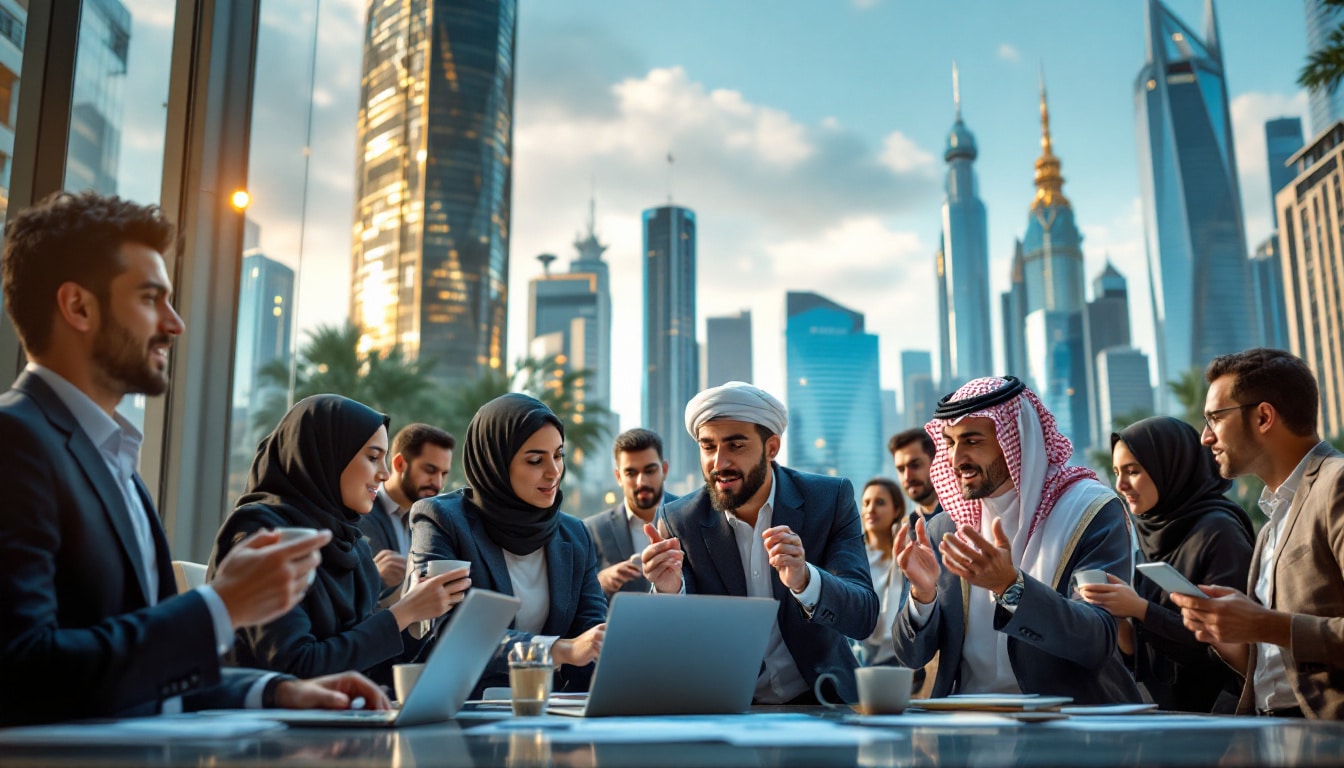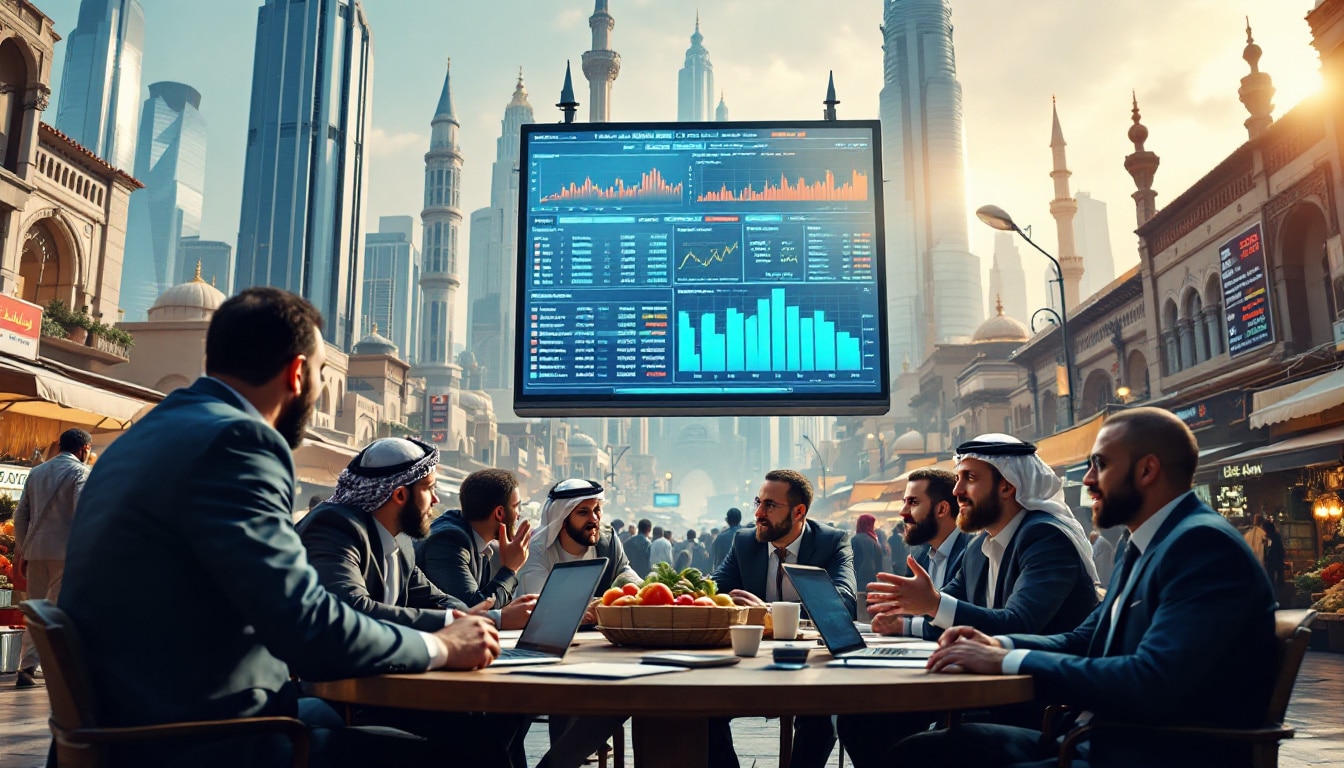Welcome to our digital universe where every click counts.Your online experience is shaped by the intelligent use of cookies and data.We are committed to providing optimized and secure services through these technologies.
By using cookies, we ensure the efficient delivery and maintenance of our services. They also allow us to monitor potential interruptions and protect against spam, fraud, and abuse. Through the analysis of public engagement and site statistics, we better understand the use of our services and improve their quality. If you accept all options, we will be able to develop new services and measure the effectiveness of advertisements. Additionally, we will be able to offer you personalized content and advertisements tailored to your preferences and previous activities on your browser. To manage your preferences, select “More options” and visit g.co/privacytools at any time.

Table des matières
ToggleThe impact of economic reforms in the Arab world
The economic reforms in the Arab world play a crucial role in transforming regional economies. Several countries in the region have undertaken initiatives aimed at diversifying their economies, traditionally dependent on hydrocarbons. For example, Saudi Arabia, with its Vision 2030 plan, seeks to stimulate non-oil sectors such as tourism, entertainment, and information technology. These reforms are essential to reducing dependence on oil and creating sustainable jobs for a young and growing population.
In Egypt, the government has implemented structural reforms in collaboration with the International Monetary Fund (IMF), aimed at stabilizing the economy, reducing budget deficits, and attracting foreign investments. These measures, although unpopular in the short term, are designed to establish a solid and resilient economic foundation in the face of global price fluctuations in oil and economic crises.
Moreover, initiatives to improve the business environment and facilitate company creation in countries like the United Arab Emirates and Qatar have led to a significant increase in foreign investments. Free zones and attractive tax incentives have been established to encourage entrepreneurs and international investors, thereby strengthening the position of these countries as regional economic hubs.
Economic reforms are not limited to macroeconomic policies. They also include initiatives to strengthen the private sector, enhance the efficiency of the public sector, and promote innovation and education. These integrated efforts are essential to ensure sustained and inclusive economic growth capable of addressing the current socio-economic challenges of the Arab world.
To learn more about economic news in the region, check out the essentials of news for businesses, finance, and politics in the Arab world.
The political dynamics influencing the Arab economy
The political dynamics within the Arab world have a significant impact on the stability and economic growth of the region. Geopolitical tensions, regime changes, and social movements can create uncertainties that affect foreign investments and consumer confidence. For example, the recent protests in Algeria and the ongoing tensions between Saudi Arabia and Iran have direct repercussions on financial markets and regional economic projects.
Resolving internal and external conflicts is essential to fostering an environment conducive to economic growth. Arab states are increasingly investing in economic diplomacy and bilateral trade agreements to stabilize relations and promote regional cooperation. These efforts aim to create economic corridors that facilitate trade exchanges and strengthen economic ties between Arab nations.
Furthermore, the rise of youth movements and demands for democratic reforms in several Arab world countries is prompting governments to adopt more transparent and inclusive policies. This political transition can lead to better governance, reduced corruption, and more effective resource management, which is crucial for long-term economic development.
Political dynamics also influence fiscal and monetary policies, impacting how governments finance their infrastructure projects and manage their public debt. Stable and predictable governance is fundamental to attracting investments and ensuring sustainable growth.
Discover the latest political and economic analyses on Senior Planet Intelligence in the spotlight.
The financial challenges facing Arab economies
The economies of the Arab world face several financial challenges that threaten their stability and growth. One of the main challenges is the volatility of oil prices, which directly impacts public revenues and the budgets of producing countries. Fluctuations in oil prices can lead to budget deficits, forcing governments to adjust their spending and reevaluate their investment strategies.
In response to these challenges, many Arab countries are seeking to diversify their revenue sources by investing in non-oil sectors such as tourism, real estate, finance, and information technology. This diversification is essential to reduce vulnerability to external shocks and to create more resilient and sustainable economies.
Another major challenge is the management of public debt. Some Arab countries have accumulated high levels of debt, limiting their ability to invest in development projects and provide quality public services. Implementing prudent fiscal policies and renegotiating debt terms are necessary measures to restore financial stability and ensure sustained economic growth.
Structural reforms aimed at improving the efficiency of the public sector, reducing bureaucracy, and combating corruption are also crucial to strengthen the confidence of investors and citizens. Transparent and responsible management of public finances is essential to attract foreign investments and stimulate economic development.
To delve deeper into the current financial issues, check the essential manual for elderly home care.
Investment opportunities in the Arab world
The Arab world offers numerous investment opportunities due to its economic diversity and growing markets. The renewable energy, technology, real estate, and infrastructure sectors present attractive prospects for both local and international investors. For example, the development of green energies in countries like the United Arab Emirates and Morocco creates opportunities for companies specializing in solar and wind technologies.
The technology sector is booming in several Arab countries, particularly in Saudi Arabia, Kuwait, and Qatar. Digital transformation initiatives and investments in tech startups are driving innovation and attracting talent, creating an environment conducive to the growth of tech companies. Government-supported incubators and accelerators for startups are important catalysts for the regional entrepreneurial ecosystem.
The real estate market in the Arab world is also experiencing strong demand, particularly in major cities like Dubai, Riyadh, and Cairo. Ambitious urban development projects, such as smart cities and free zones, offer investment opportunities for real estate developers and foreign investors. Population growth and rapid urbanization fuel the demand for modern housing and quality infrastructure.
Furthermore, the finance and banking sectors are expanding, with increasing investments in fintechs and innovative financial services. Initiatives aimed at modernizing the financial system and adopting advanced technologies enhance the competitiveness of Arab financial markets and attract international capital.
To explore investment opportunities, visit A ray of hope – China Daily.
Post-pandemic economic trends in the Arab world
The COVID-19 pandemic had a profound impact on the economies of the Arab world, accelerating certain trends while slowing others. The post-pandemic economic recovery is marked by notable resilience in several sectors, but also by persistent challenges such as unemployment and increased public debt. Rapid adaptation to changes and the implementation of effective recovery strategies are essential to support long-term economic growth.
One major trend is the acceleration of the digitalization of businesses and public services. The pandemic highlighted the importance of digital technologies to ensure business continuity and improve operational efficiency. Many Arab countries are investing in digital infrastructure, technological skills, and online platforms to foster a dynamic and inclusive digital economy.
The tourism sector was particularly affected by the pandemic, but significant recovery efforts are underway to revitalize this essential industry. Initiatives like promoting domestic tourism, diversifying tourism offerings, and improving hotel infrastructure aim to attract new visitors and support businesses in the sector.
Support policies for small and medium-sized enterprises (SMEs) are also crucial for economic recovery. Arab governments are implementing funding programs, grants, and tax measures to help SMEs overcome the difficulties caused by the pandemic. Strengthening the private sector is vital to stimulate innovation, create jobs, and foster sustainable economic growth.
To keep track of post-pandemic economic trends, check the essential news for businesses, finance, and politics in the Arab world.
Sustainable initiatives and the economic future of the Arab world
Sustainable initiatives are at the heart of the economic development strategy of the Arab world to ensure environmentally friendly and socially equitable growth. Many countries in the region are investing in renewable energy, natural resource management, and green technologies to reduce their carbon footprint and promote a circular economy.
Solar and wind energy projects, particularly in Morocco, the United Arab Emirates, and Saudi Arabia, demonstrate a strong commitment to energy transition. These initiatives aim not only to diversify energy sources but also to position the Arab world as a leader in the renewable energy sector on a global scale.
In addition to energy, water management and agricultural resource management is another key area for sustainable initiatives. Innovative technologies such as precision irrigation, water recycling, and vertical farming are being adopted to improve resource use efficiency and ensure food security in a region facing significant climatic and geographical challenges.
Sustainable development policies also include efforts to promote gender equality, education, and vocational training. These measures are essential to create a skilled and diverse workforce capable of meeting the needs of a modern and competitive economy.
Investment in sustainable infrastructure, such as green buildings, public transportation, and waste management systems, also contributes to green economic growth. These projects create jobs, stimulate innovation, and improve the quality of life for citizens while respecting the principles of environmental sustainability.
To learn more about sustainable initiatives in the Arab world, check Senior Planet Intelligence in the spotlight.








